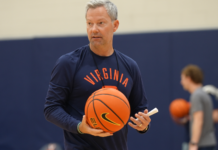Yesterday, Kevin Durant chose to leave his home of the last nine years,Oklahoma City, a Western Conference Finalist, and sign with the Golden State Warriors, a team who finished with the best regular season record in league history. With Durant in tow, Steph Curry, Klay Thompson and Draymond Green represent perhaps the most talented core in NBA history—an unparalleled blur of complementary skills and abilities. If they are able to keep that core intact, they will command the league for the next handful of years.

It is a power move for sure; No player of Durant’s caliber has ever joined a team as good as the Warriors, and his decision spawned ripple effects which will reverberate throughout the entire league. It has also, predictably, drawn the ire of fans and players alike. Criticism of Durant’s decision is like the brainchild of LeBron’s Decision back in 2010, it is the confluence of both the “you can win, but only with a team we deem ‘underdog’ enough” and the “Michael Jordan never would have joined forces with his adversaries” camps. Both camps are boring, both prescribe to an NBA mythology untethered to reality.
Granted, there is a way to navigate this NBA crisis that’s equal parts liberal and retrospective. The first camp is basically rooted in the belief that player movement, especially to join a team ready win, is bad. Basically a player should be drafted by a team and be subject to his team’s management, unable to forge his own upward mobility. This obviously conflicts with our other, far more arbitrary, standard: “all that matters is championships.” Durant’s decision was an exercise of both; him exercising his right as an individual to explore alternative employment, eventually deciding on the opportunity which offered him the best promise of championships.
To find problem with Durant leaving is to believe in a mythology rooted in the 80’s and 90’s where we look back and conclude that Larry Bird and Michael Jordan would have never joined forces with their respective rivals. This ignores these teams having existed in a far different league and labor market environment. Comparing cross-eras in this way is as rudderless a pursuit as attempting to compare cross-era players’ statistics. Condemning Durant also runs counter to belief in the basic individual right to maximize the quality and utility of their professional life. Unless you want to concede you treat NBA athletes differently in this regard, this point cannot really be made. Durant is completely within his own right to leave, as were the Warriors completely within theirs’ when they courted him despite finishing with the league’s best regular season record.
However, it can also be true that the NBA is at least a little bit less compelling now that both Durant and the Warriors accomplished their respective pursuits. For starters, the chance a heavyweight will fall is always something to watch, but this Warriors team does not figure to fall. The experience of watching Durant and Westbrook try like heck to win a championship is inherently more rewarding than watching the Warriors coast to a championship on the gravity of their players’ collective powers; human beings will always gravitate toward the underdog or the sentimentality of organic growth.
This is where the dissonance exists: it is possible to believe Durant is within his own right without thinking he was actually right. Durant passed up on the sentimentality of organic growth, the ‘underdog’ story with Oklahoma City – a dubious distinction considering their immense talent – to join forces with a team where if he wins a championship it will be immensely hard to delineate his individual abilities and accomplishments from the team he accrued and developed them on.
In his letter published in The Players’ Tribune, Durant referenced “the potential for (his) growth as a player” as a factor in his decision, a fascinating concept considering how the notion conflicts with how we actually remember players we consider great: as the stalwarts of their team, the individual force which galvanizes the collective whole. Durant will probably never again be able to separate his individual achievements from the achievements of the Warriors as a whole, and with that confluence he probably missed out on his chance for true immortality as a player.
But that is the point: Durant views the maximizing of his individual as the same as the maximizing of team. Basically, the more championships he wins, the more he grew as a player. It is the mentality we have always wanted from a superstar, carried out in a manner completely allowable under, and in fact facilitated by, the league’s current Collective Bargaining Agreement. Just this time it did not create the NBA landscape we always envisioned it would.
















